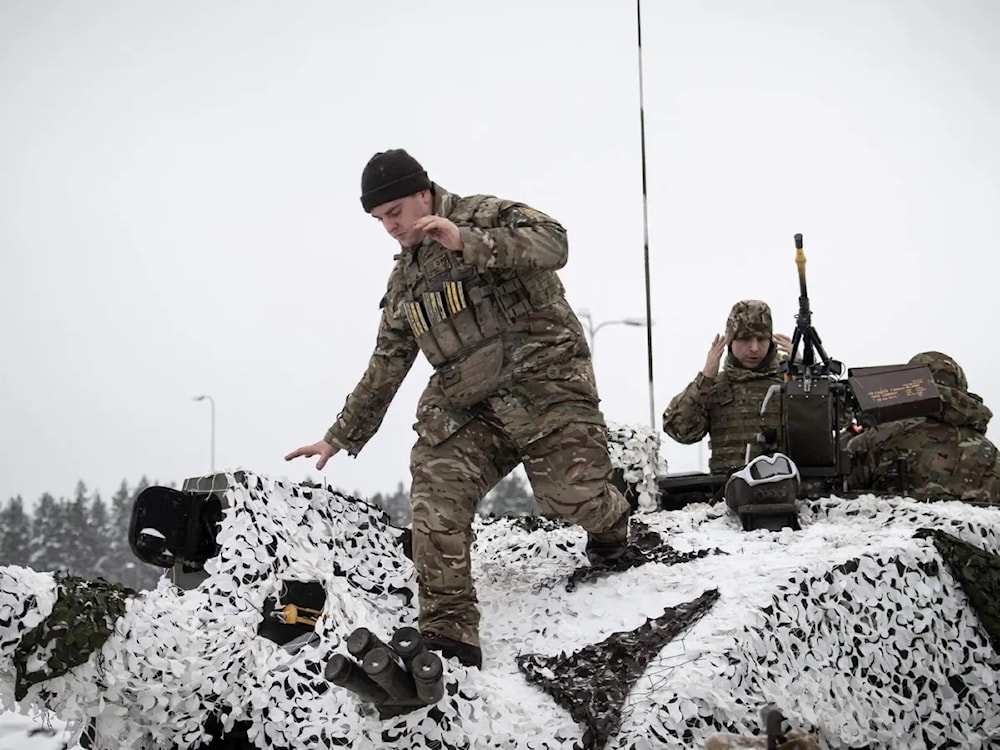UK army mulls easing security checks to tackle recruitment issue
The proposed changes aim to boost personnel numbers amid the ongoing staffing challenges faced by the British Army.
-

British soldiers take part in an exercise as part of NATO’s deployment in Poland and the Baltic nations in 2023. (AFP)
The British Army is considering easing security checks for overseas recruits to address its staffing crisis, as per a leaked internal document. The document highlights security clearance as a major obstacle for non-UK personnel seeking commissions in the Army.
Currently, vetting for officers includes counter-terrorism checks, with security clearance described as being "the most common type of vetting process and determines that a person’s character and personal circumstances are such that they can be trusted to work in a position that involves long-term, frequent, and uncontrolled access to secret assets"
The proposed changes aim to boost personnel numbers amid the ongoing staffing challenges faced by the British Army.
The requirement for a five-year UK residency to obtain security clearance has been deemed "prohibitive" for overseas recruits seeking officer and intelligence positions, according to a leaked document.
This comes as the Army acknowledges challenges in attracting talent from ethnic minority backgrounds to the officer corps. While individuals from Commonwealth countries are eligible to serve in the British Army, only 131 officers from outside Britain currently serve. Among them, 28 are recorded as being from ethnic minority backgrounds, while the majority are categorized as white.
A coalition of former Army officials has signed a letter addressed to the UK's Defense Minister, Grant Shapps, expressing concerns about the revised policy, labeling it as "dangerous madness".
The individuals who signed the letter, include former head of the Royal Marines Lieutenant General Sir Henry Beverly and Major General Tim Cross, the highest-ranking British officer involved in Iraq's post-invasion stage.
"These intolerable policies are forcing the British Armed Forces into moral disarmament and it cannot stand," they said.
A senior US general also cautioned that the UK's shrinking army is "not what it used to be."
Given the existing patterns, the British army is projected to have only 52,000 troops in the next decade. In twelve months until September of the previous year, the army's numbers dropped from 79,139 to 75,983, with more soldiers leaving than joining.
UK deploys its military forces in the Middle East!
In this context, it is vital to mention the UK's participation in several military operations that could have taken a toll on its army.
The UK is a significant part of the US-led maritime coalition, Operation Prosperity Guardian, which has militarized the Red Sea in an attempt to protect "Israel" and deter the Yemeni Armed Forces, but in vain. The UK has also been leading a series of attacks on Yemen.
Moreover, according to Declassified UK, an investigation showed that the UK military has flown 50 espionage operations over Gaza since the beginning of December to help "Israel".
The information-collecting missions are carried out by Shadow R1 surveillance aircraft that take off from Britain's controversial Akrotiri air station in Cyprus.
Britain maintains two "Sovereign Base Areas" on Cyprus, Dhekelia in the east and Akrotiri in the west, which are enormous, highly covert military and intelligence complexes covering 3% of the island's geographical area and historically used for UK bombing missions in the Middle East and its complicity in the war on Gaza.
In early December, the UK's Defense Ministry announced it would start conducting surveillance flights over Gaza, occupied Palestine, and the Eastern Mediterranean, claiming that operations aim to locate sites of captives held by the Palestinian Resistance.
One week after October 7, the UK government announced that it had increased its military presence in the Middle East by deploying two Royal Navy ships, spy hardware, and an additional 1,000 personnel “to support Israel, reinforce regional stability and prevent escalation."
Read more: Faulty UK Royal Navy warship pulled out of NATO exercise

 4 Min Read
4 Min Read










